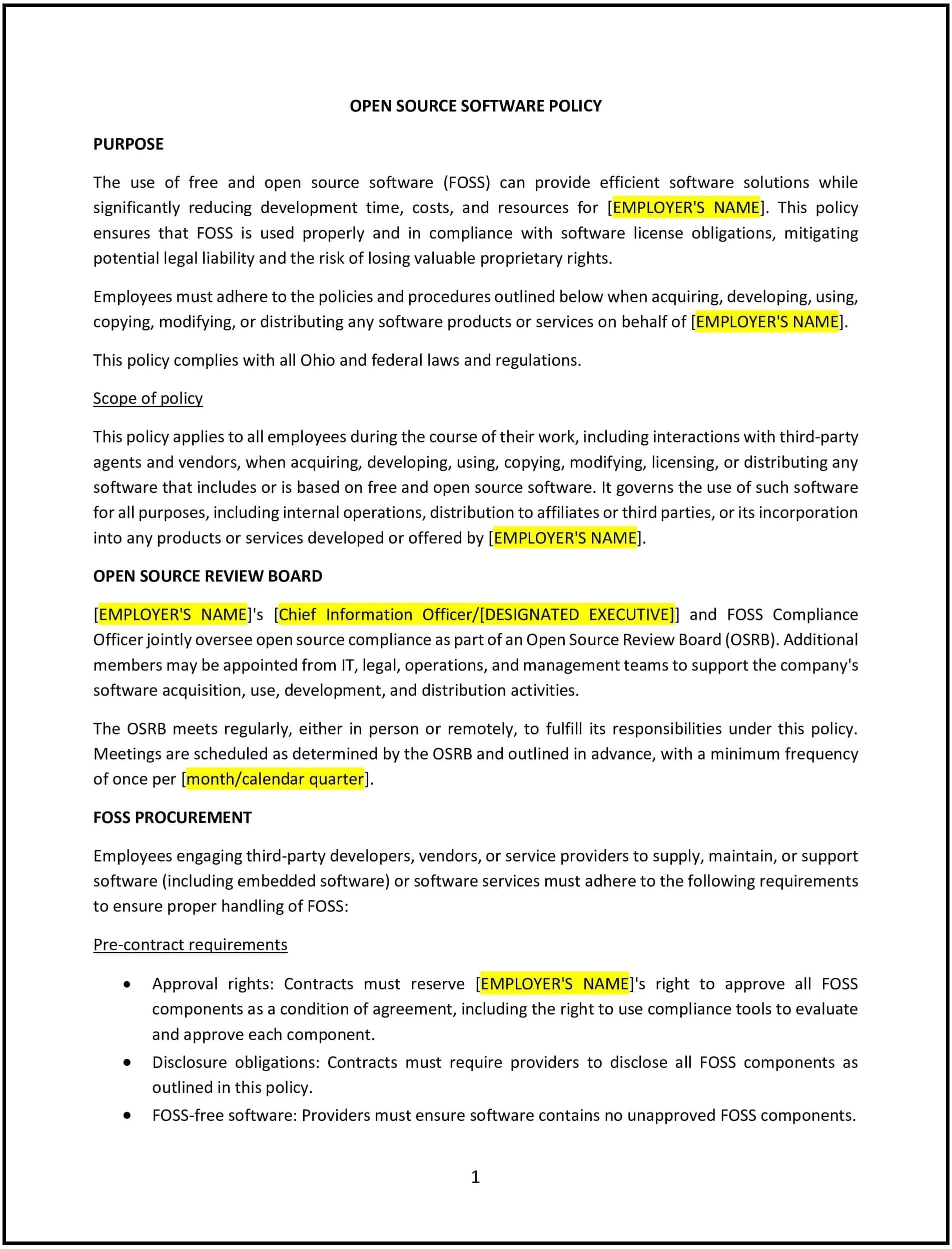Got contracts to review? While you're here for policies, let Cobrief make contract review effortless—start your free review now.

Customize this template for free
Open source software policy (Ohio)
An open source software policy provides Ohio businesses with guidelines for the use, contribution, and distribution of open source software within the organization. This policy helps ensure that employees understand the legal and security implications of using open source software, including licensing requirements, compatibility issues, and intellectual property considerations. It also sets guidelines for contributing to open source projects, ensuring that the company’s contributions align with its goals and intellectual property protections.
By implementing this policy, Ohio businesses can protect themselves from legal risks, promote the responsible use of open source software, and encourage innovation and collaboration through contributions to the open-source community.
How to use this open source software policy (Ohio)
- Define acceptable use: The policy should specify the types of open source software that can be used within the business. This includes guidelines for evaluating the legal and security implications of using open source software and ensuring compliance with the relevant licenses.
- Address licensing requirements: The policy should outline the importance of understanding and adhering to open source software licenses, including ensuring that employees are aware of the terms and conditions for using and distributing open source software.
- Establish procedures for approval: The policy should specify how employees should seek approval before integrating open source software into business projects. This ensures that the software is compatible with the organization’s infrastructure and complies with licensing agreements.
- Set guidelines for contributing to open source projects: The policy should provide guidelines on how employees can contribute to open source projects. This may include obtaining approval before contributing to ensure that the contributions align with the business’s interests and intellectual property protections.
- Address security and maintenance: The policy should emphasize the need for regular security checks and updates for open source software, as well as establish protocols for handling vulnerabilities or security issues in the software.
- Establish intellectual property protections: The policy should clarify the ownership of any contributions to open source projects, ensuring that the business retains the intellectual property rights to its proprietary software while complying with open source licenses.
- Monitor compliance: The policy should include a mechanism for monitoring compliance with open source licenses and guidelines, ensuring that the business adheres to legal requirements and does not inadvertently violate license terms.
- Review and update regularly: The policy should be reviewed periodically to ensure it remains aligned with Ohio state laws, federal regulations, and the evolving landscape of open source software.
Benefits of using this open source software policy (Ohio)
This policy provides several key benefits for Ohio businesses:
- Reduces legal risks: By setting clear guidelines for using and contributing to open source software, the policy helps minimize the risk of legal issues related to license violations, intellectual property disputes, or non-compliance.
- Promotes responsible use: The policy encourages responsible and informed use of open source software, ensuring that employees understand the potential risks and rewards of using such software within the business.
- Protects intellectual property: By establishing guidelines for contributions to open source projects, the policy helps ensure that any contributions made by the business do not jeopardize its intellectual property or proprietary technology.
- Encourages innovation: The policy supports innovation by allowing the business to participate in open source communities, fostering collaboration and the development of new ideas and technologies.
- Improves security: The policy emphasizes the importance of maintaining the security and integrity of open source software, ensuring that vulnerabilities are addressed promptly and that the software remains secure for business use.
- Promotes collaboration: By supporting contributions to open source projects, the policy helps the business engage with the broader tech community, fostering a culture of collaboration and knowledge sharing.
- Enhances transparency: The policy ensures that all employees are on the same page when it comes to the use of open source software, promoting transparency in software selection and integration.
Tips for using this open source software policy (Ohio)
- Communicate the policy clearly: Ensure that all employees are aware of the open source software policy by including it in the employee handbook, discussing it during onboarding, and providing ongoing training about the responsible use of open source software.
- Set up an approval process: Implement a clear process for employees to follow when requesting to use or contribute to open source software. This ensures that all software is vetted for compliance and compatibility before use.
- Regularly review open source software: Conduct periodic reviews of open source software used within the organization to ensure it remains secure, compliant, and aligned with the business’s objectives.
- Foster a collaborative culture: Encourage employees to contribute to open source projects that align with the business’s goals while ensuring that intellectual property rights and company policies are respected.
- Maintain security best practices: Implement security protocols to regularly check for vulnerabilities in open source software and apply updates or patches as necessary to protect the business’s IT infrastructure.
- Provide documentation and resources: Offer resources and tools to help employees understand open source licensing and compliance, including access to legal or IT professionals for guidance when needed.
- Review and update regularly: Regularly review and update the policy to keep up with changes in Ohio state laws, open source software developments, and the business’s evolving needs.